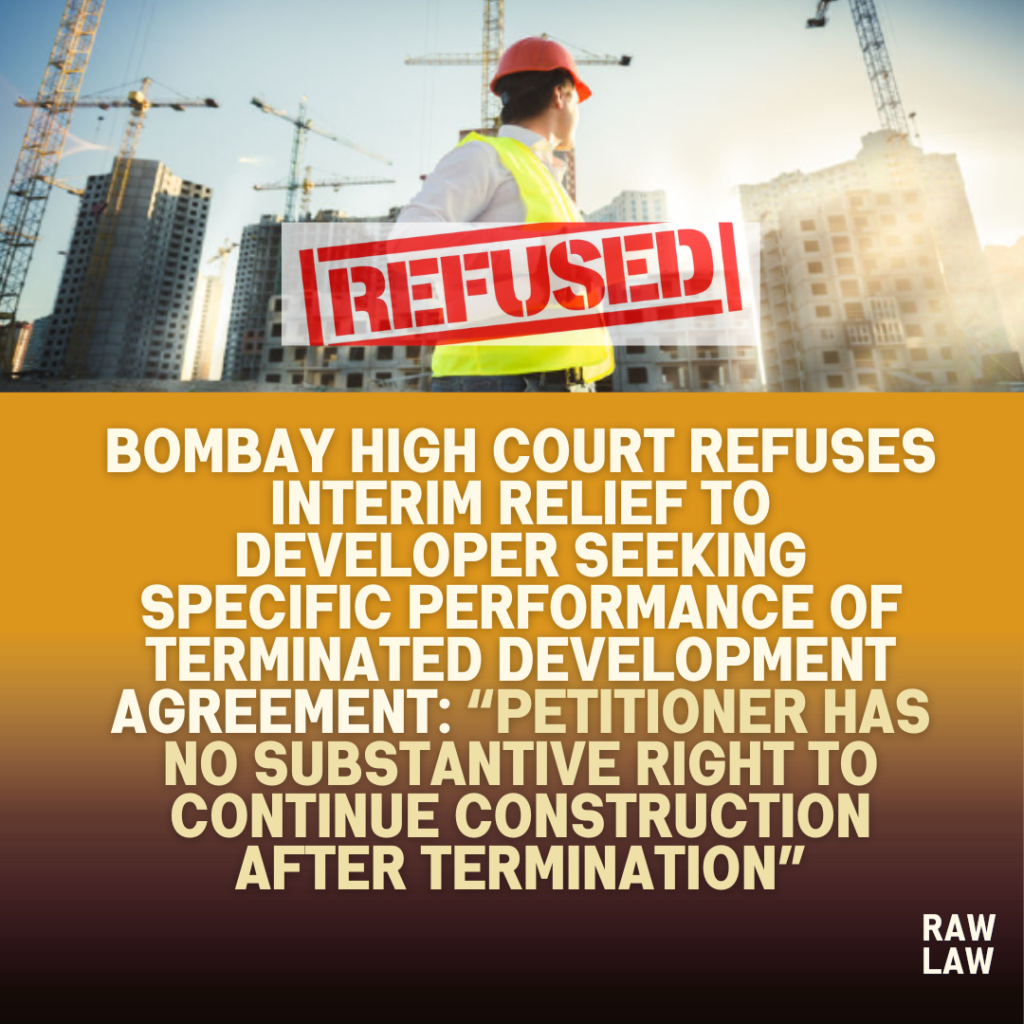Court’s Decision
The Bombay High Court rejected a developer’s interim application seeking specific performance and status quo protection in a suit arising from the termination of a development agreement. The Court held that after termination of the agreement and revocation of Power of Attorney, the developer had no enforceable right to continue construction. The Court observed, “If the agreement is terminated and power of attorney is revoked, the developer cannot be permitted to continue construction pending adjudication, especially when serious disputes exist.”
Facts
The petitioner, a Limited Liability Partnership firm, entered into a Development Agreement with the respondent housing society in March 2019 for redevelopment of its premises. In pursuance of the agreement, the society issued an Irrevocable License and Power of Attorney in favour of the developer. Subsequently, disputes arose when the society accused the developer of delay, failure to pay transit rent, and unauthorised construction. A notice of termination was issued in February 2024, which was challenged by the petitioner.
The petitioner filed a commercial suit for specific performance and an interim application seeking orders restraining the society from acting on the termination, and status quo protection to continue construction.
Issues
- Whether the petitioner is entitled to interim protection for continuing with redevelopment work post-termination.
- Whether a prima facie case exists to grant interim relief under the Specific Relief Act, 1963.
Petitioner’s Arguments
The petitioner argued that the agreement was wrongly and illegally terminated. They contended that significant construction had been undertaken with substantial financial investment and that the termination was arbitrary and mala fide. The petitioner relied on Clause 38 of the agreement, which permitted a 3-month cure period before termination, claiming the society violated this clause. They submitted that they were willing to deposit the alleged dues and complete the project, and sought specific performance under the Specific Relief Act.
Respondent’s Arguments
The society responded that the developer had breached the agreement by failing to pay monthly rent to members, not obtaining mandatory approvals for additional construction, and carrying out construction beyond sanctioned plans. It argued that the agreement stood validly terminated and that power of attorney had also been revoked. The society opposed interim relief on the ground that the petitioner had no subsisting right, and any continuation of construction would irreversibly prejudice the society and its members.
Analysis of the Law
The Court examined the contours of interim relief under the Specific Relief Act and the requirements of prima facie case, balance of convenience, and irreparable harm. It observed that specific performance is a discretionary remedy and the agreement’s termination, if not stayed, deprived the petitioner of any enforceable right.
The Court held that in contracts involving redevelopment of property, particularly when the license and power of attorney are terminated, no continued right of possession or construction can be claimed unless the contract is reinstated or a fresh interim order is passed.
The Court also referred to the revocation of Power of Attorney and its impact on the developer’s right to act on behalf of the society.
Precedent Analysis
- Nahalchand Laloochand Pvt. Ltd. v. Panchali Co-op. Housing Society Ltd., (2010) 9 SCC 536: Held that rights of flat purchasers arise only when the developer adheres to contractual obligations.
- Shiv Kumar Sharma v. Santosh Kumari, (2007) 8 SCC 600: Specific performance is a discretionary remedy, and mere hardship or delay cannot justify interim relief.
- Windsor Realty Pvt. Ltd. v. State of Maharashtra, 2022 SCC OnLine Bom 1023: Interim relief post termination not warranted unless prima facie case of wrongful termination established.
- T. Arivandandam v. T.V. Satyapal, (1977) 4 SCC 467: Frivolous and vexatious litigation should be discouraged at the interim stage.
These judgments fortified the Court’s reasoning that interim relief should not be granted where the petitioner’s rights are extinguished by valid termination and revocation of authority.
Court’s Reasoning
The Court found that:
- The petitioner failed to establish a prima facie case of wrongful termination.
- Serious allegations such as unauthorised construction and non-payment of dues weigh against equitable relief.
- Any continuation of construction would cause irreversible prejudice to the society and flat purchasers.
- Since the agreement was already terminated and Power of Attorney revoked, no subsisting right to continue redevelopment existed.
The Court also emphasised that granting interim protection in such situations would encourage breach of contract and undermine the rights of landowners/society members.
Conclusion
The Bombay High Court dismissed the interim application and refused to grant any relief allowing the developer to continue construction. It held that the petitioner had no enforceable or subsisting right after termination of the development agreement and revocation of the Power of Attorney, and any further construction would be impermissible.
Implications
- Reinforces the principle that developers cannot seek interim protection post-termination unless prima facie wrongful termination is established.
- Sets a precedent for societies seeking to replace defaulting developers.
- Clarifies that interim protection is not automatic in specific performance suits and must be grounded in equity and law.
FAQs
1. Can a developer continue construction after termination of a development agreement?
No, unless the termination is stayed or found prima facie invalid, the developer cannot claim rights post-termination, especially if Power of Attorney is revoked.
2. What must a developer prove to get interim relief in a specific performance suit?
The developer must establish a prima facie case of wrongful termination, balance of convenience in its favour, and likelihood of irreparable harm.
3. Does revocation of Power of Attorney affect the developer’s right to act on behalf of the society?
Yes, revocation extinguishes the developer’s authority to act for the society unless such revocation is held invalid or stayed.



